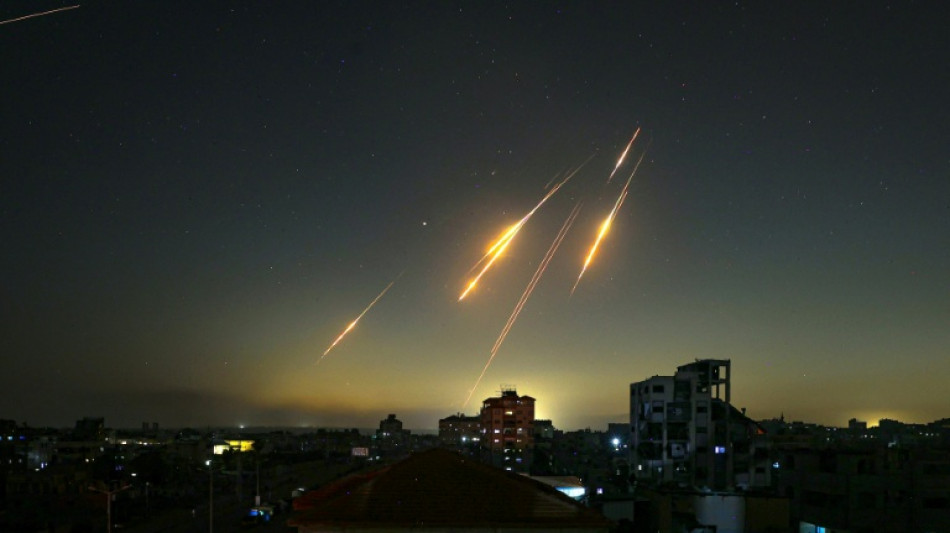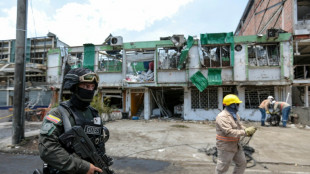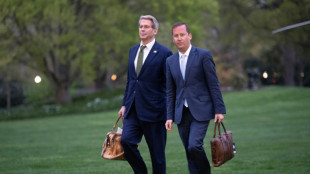
Iran launches more missiles as Israel targets Tehran

Iran launched a new wave of missiles at Israel on Saturday, wounding several people in residential buildings, while Israel said it was striking Tehran.
The fresh attacks came after Israeli Prime Minister Benjamin Netanyahu vowed to hit "every target of the ayatollah regime", and Iranian President Masoud Pezeshkian warned further strikes would draw "a more severe and powerful response".
As calls for de-escalation grew, a new round of nuclear talks between the United States and Iran scheduled for Sunday was cancelled, with Iran saying it could not negotiate while under attack from Israel.
Israel's operation, which began early Friday, has targeted Iran's air defences and hit key nuclear and military sites, killing dozens of people including top army commanders and atomic scientists, according to Tehran.
On Saturday night Israel said it was simultaneously working to intercept a new salvo of missiles fired from Iran, while also carrying out strikes on "military targets in Tehran".
Iranian news agency Tasnim reported that an Israeli strike had targeted the country's defence ministry headquarters in Tehran and damaged one of its buildings. The ministry did not comment.
Iran, meanwhile, announced a "new wave" of attacks targeting Israel.
Israel's emergency services said an Iranian missile hit a home in the Haifa region, leaving 14 people injured, including one in critical condition.
Israeli strikes meanwhile hit two fuel depots in Tehran, the Iranian oil ministry said Sunday.
According to the oil ministry, the oil depots at Shahran northwest of Tehran and another reservoir south of the city were hit.
An AFP journalist saw the depot at Shahran on fire.
- 'Every site, every target' -
Iran's UN ambassador said 78 people were killed and 320 wounded in Friday's first wave of Israeli strikes.
Israel on Saturday said three people were killed and 76 wounded by Iran's drone and missile barrage the night before.
Netanyahu has vowed to keep up Israel's campaign.
"We will hit every site, every target of the ayatollah regime," he said in a video statement, threatening greater action "in the coming days".
He added that the Israeli campaign had dealt a "real blow" to Iran's nuclear programme and maintained it had the "clear support" of US President Donald Trump.
Trump said he and Russian President Vladimir Putin had agreed in a phone call on Saturday that the conflict between Iran and Israel "should end".
Pezeshkian said meanwhile that "the continuation of the Zionist aggression will be met with a more severe and powerful response from the Iranian armed forces".
According to a statement from his office, Pezeshkian also condemned Washington's "dishonesty" for supporting Israel while engaged in nuclear talks with Iran -- which mediator Oman said would no longer take place on Sunday.
Western governments have repeatedly accused Iran of seeking a nuclear weapon, which it denies.
Iran's top nuclear negotiator, Foreign Minister Abbas Araghchi, said the Israeli attacks undermined negotiations and were pushing the region into a "dangerous cycle of violence".
- Foreign concern -
After decades of enmity and conflict by proxy, it is the first time the arch-enemies have traded fire with such intensity, triggering fears of a prolonged conflict that could engulf the Middle East.
Highlighting the unease, Turkish President Recep Tayyip Erdogan warned against a "devastating war" with regional consequences, in a call with Saudi Crown Prince Mohammed bin Salman, Ankara said.
Israeli strikes have hit Iran's Natanz uranium enrichment plant and killed its highest-ranking military officer, Mohammad Bagheri, as well as the head of the powerful Islamic Revolutionary Guard Corps, Hossein Salami.
The Israeli military said its strikes had killed more than 20 Iranian commanders.
Iranian media reported five Guards killed Saturday in Israeli strikes, while authorities in one northwestern province said 30 military personnel had been killed there since Friday.
Iran called on its citizens to unite in the country's defence, while Netanyahu urged them to rise up against against the government.
Iran's Mehr news agency said Tehran had warned Britain, France and the United States it could retaliate if they came to Israel's defence.
- 'Everything was shaking' -
AFP images from the city of Ramat Gan near Tel Aviv showed blown-out buildings, destroyed vehicles and streets strewn with debris after Iran's first wave of attacks.
Iran's Revolutionary Guards said they had struck dozens of targets in Israel. One Iranian missile wounded seven Israeli soldiers, the military said.
Firefighters had worked for hours to free people trapped in a Tel Aviv high-rise building on Friday.
Chen Gabizon, a resident, said he ran to an underground shelter after receiving an alert.
"We just heard a very big explosion, everything was shaking, smoke, dust, everything was all over the place," he said.
In Tehran, fire and heavy smoke billowed over Mehrabad airport on Saturday, an AFP journalist said.
The Israeli army said it had struck an underground military facility Saturday in western Iran's Khorramabad that contained surface-to-surface and cruise missiles.
Iranian media also reported a "massive explosion" following an Israeli drone strike on an oil refinery in the southern city of Kangan.
The attacks prompted several countries to temporarily ground air traffic, with Jordan again shutting its airspace late Saturday after it had briefly reopened it.
burs/ser/rlp
B.Turner--SFF

 London
London

 Manchester
Manchester
 Glasgow
Glasgow
 Dublin
Dublin
 Belfast
Belfast
 Washington
Washington
 Denver
Denver
 Atlanta
Atlanta
 Dallas
Dallas
 Houston Texas
Houston Texas
 New Orleans
New Orleans
 El Paso
El Paso
 Phoenix
Phoenix
 Los Angeles
Los Angeles



